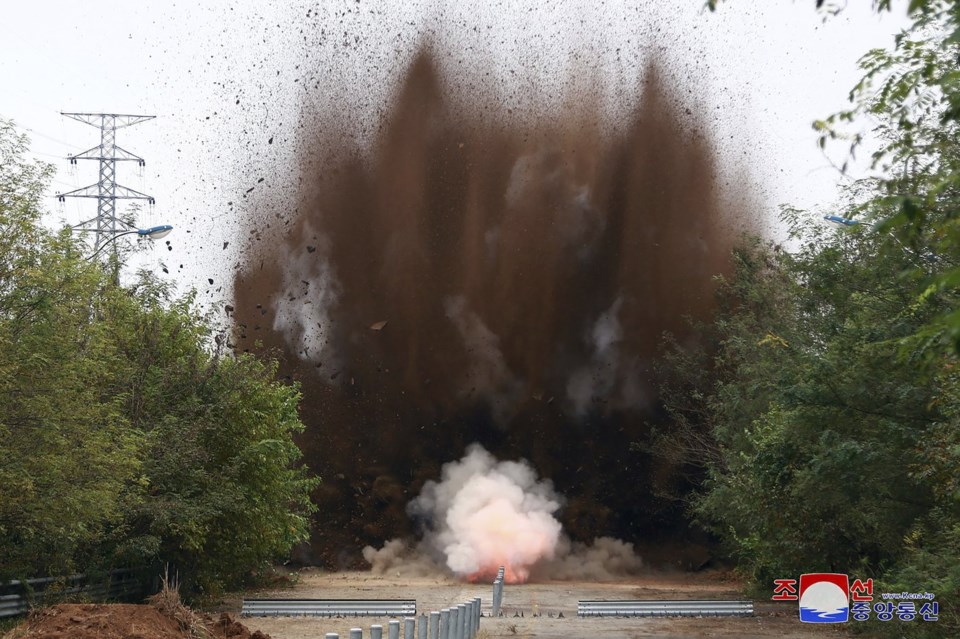SEOUL, South Korea (AP) ŌĆö North Korea confirmed Thursday that its recently revised constitution defines South Korea as ŌĆ£a hostile state" for the first time, two days after it blew up that once connected the country with the South.
North KoreaŌĆÖs rubber-stamp parliament met for two days last week to rewrite the constitution but state media hadnŌĆÖt immediately provided many details about the session. Leader Kim Jong Un had called for the constitutional change at that parliamentary meeting to designate South Korea as the countryŌĆÖs main enemy, remove the goal of a peaceful Korean unification and define the NorthŌĆÖs sovereign, territorial sphere.
The official Korean Central News Agency said Thursday that its recent demolition of parts of the northern sections of the inter-Korean road and rail links was ŌĆ£an inevitable and legitimate measure taken in keeping with the requirement of the DPRK constitution which clearly defines the ROK as a hostile state.ŌĆØ
DPRK stands for Democratic People's Republic of Korea, the North's official name, while ROK stands for Republic of Korea, the South's formal name.
KCNA gave no further details of the new constitution. An earlier KCNA report on the Oct. 7-8 meeting of the Supreme People's Assembly only said the constitution was revised to amend the legal ages of North Koreans for working and participating in elections, but didn't say whether the meeting dealt with Kim's demand as well.
ŌĆ£There may still be an internal propaganda review underway about the appropriate way to disclose the constitutional revisions, but this confirmation was expected,ŌĆØ said Ankit Panda, an expert with the Carnegie Endowment for International Peace.
KimŌĆÖs order in January to rewrite the constitution caught many foreign experts by surprise because it was seen as eliminating the idea of shared statehood between the war-divided Koreas and breaking away with his predecessorsŌĆÖ long-cherished dreams of peacefully achieving a unified Korea on the NorthŌĆÖs terms. In the past months, North Korea has torn down monuments symbolizing rapprochement with South Korea and abolished state agencies handling inter-Korean relations.
Some experts say Kim likely aims to guard against South Korean cultural influence and bolster his family's dynastic rule. Others say Kim wants legal room to use his nuclear weapons against South Korea by making it as a foreign enemy state, not a partner for potential unification which shares a sense of national homogeneity. They say Kim may also want to seek direct dealings with the U.S. in future diplomacy on its nuclear program, not via South Korea.
KCNA, citing North KoreaŌĆÖs Defense Ministry, reported that North Korea blew up the 60-meter-long (197 feet) sections of two pairs of the roads and railway routes ŌĆö one pair on the western portion of the inter-Korean border and the other on the eastern side of the border.
Largely built with South Korean money, the road and rail links were a symbol of now-dormant inter-Korean reconciliation movements. In the 2000s, the two Koreas reconnected the road and rail routes for the first time since the end of the 1950-53 Korean War, but their operations were halted later as the rivals bickered over North Korea's nuclear ambitions and other issues.
Last week, North Korea said it would permanently block its with South Korea and build front-line defense structures. South Korean officials said North Korea had been adding anti-tank barriers and laying mines along the border since earlier this year.
Friday's KCNA dispatch cited North Korea's Defense Ministry as saying that North Korea will continue to take measures to permanently fortify the closed southern border.
Animosities between the Koreas increased in recent days, with of flying drones over its capital Pyongyang three times this month and vowing strong military responses if similar incidents happen again. South Korea has refused to confirm whether it sent drones but warned that North Korea will face a regime demise if the safety of South Korean citizens is threatened.
Many observers say North Korea won't likely launch full-blown attacks on South Korea because it knows its military is outgunned by the U.S. and South Korean forces. But they say a miscalculation could still lead to border clashes.
Intense outside attention has been on whether the North Korean constitutional change includes new legal, territorial claims around the Koreas' disputed western sea boundary, the site where three bloody naval skirmishes and two deadly attacks blamed on North Korea happened in the past 25 years.
ŌĆ£South Korea and the United States need not overreact to North Korean moves. The recent drone incident raises the possibility of miscalculation and escalation," Panda, the expert, said.
Hyung-jin Kim, The Associated Press

